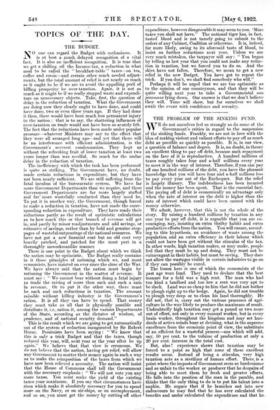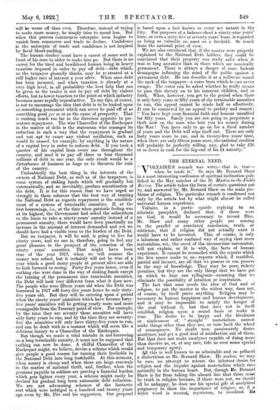THE PROBLEM OF THE SINKING FUND.
WE do not ourselves feel so strongly as do some of the Government's critics in regard to the suspension of the sinking funds. Frankly, we are not in love with the idea of making violent and valiant efforts to pay off as much debt as possible as quickly as possible. It is, in our view, a question of balance and degree. It is, no doubt, in theory an excellent thing to pay off debt, because such repayment on the face of it is reproductive. A hundred millions of taxes roughly takes four and a-half millions every year to meet it in the way of interest. Therefore, if you can pay off one hundred millions of the debt, you have the pleasant knowledge that you will have four and a-half millions less to pay every year out of the Exchequer. But the relief is largely illusory. The indebtedness has been incurred and the money has been spent. That is the essential fact. The paying off of debt is economically an advantage only when the rate of interest on the debt is higher than the rate of interest which could have been earned with the money otherwise. We admit, however, that this is not the whole of the story. By raising a hundred millions by taxation in any one year to pay off debt, it is arguable that you are en- couraging, nay, insisting on extra thrifty 'habits and extra productive efforts from the nation. You will ensure, accord- ing to this hypothesis, an avoidance of waste among the population and an extra efficiency in their labour which could not have been got without the stimulus of the tax. In other words, high taxation makes, or may make, people feel that they must be up and doing. They trust not be extravagant in their habits, but must be saving. They dare not allow the wastages visible in certain industries to go on if they can possibly be cured. The lesson here is one of which the economists of the past age were fond. They used to declare that the best manure for a field was a high rent. The man who had too kind a landlord and too low a rent was very apt to be slack. Land was so cheap to him that he did not bother to plough right up to the 'hedge. Again, he did not trouble to plough very deep or to clean his land thoroughly. He did not, that is, carry out the various processes of agri- culture in the way likely to produce the maximum of result. Undoubtedly high taxation may get a pound or two more out of effort, not only in every manual worker, but in every brain worker, throughout the kingdom and may set him- dreds of active minds busy at devising, what is the supreme excellence from the economic point of view, the substitute of an efficient for a wasteful process—one which will add, say, 50 per cent. to the volume of production at only a 20 per cent. increase in the total cost. But, alas ! experience shows that taxation may be forced to a point so high that none of these excellent results occur. Instead of being a stimulus, very high taxation acts as a sterilizer of human effort. There. is a point where the imposts of Government seem so burdensome and so unfair to the worker or producer that he despairs of being able to meet them by fresh and greater efforts. He falls into the position of the man in the parable, and thinks that the only thing to do is to put his talent into a napkin. He argues that if he launches out into new endeavours he may find that he has over calculated the benefits and wader calculated the expenditure and that he. will be worse off than ever. Therefore, instead of trying to make "more money, he simply tries to spend less. But when this process commences enterprise soon begins to vanish from commerce and trade to decline. Confidence is the antiseptic of trade and confidence is not inspired by fiscal blood-sucking. The human donkey must have a carrot of some sort in front of his nose in order to make him go. But there is no carrot for the tired and bewildered human being in heavy taxation imposed in order to pay off debt—debt which, as the taxpayer gloomily thinks, may be re-created at a still higher rate of interest a year after. When once debt has been incurred, and when taxation is already at a very high level, in all probability the best help that can be given to the trader is not to pay off debt by violent efforts, but to lower taxation to the point at which industry becomes more rapidly reproductive. To say this, of course, is not to encourage the idea that debt is to be looked upon as something permanent which can never be paid off or as something good per se or as the cause of prosperity. That is rushing much too far in the direction opposite to pre- mature repayment. The wise Chancellor of the Exchequer in the matter of debt is the statesman who manages its reduction in such a way that the repayment is gradual and not . apt to cause any violent oscillation, such as would be caused, for example, by anything in the nature of a capital levy in order to redeem debt. If you took a quarter of his capital from every one throughout the country, and used it to pay off three or four thousand millions of debt in one year, the only result would be a disturbance of business so huge as to threaten the ruin of the country. Undoubtedly the best thing in the interests of the owners of National Debt, as well as of the taxpayers, is some system of sinking funds which will gradually but automatically, and so inevitably, produce amortization of the debt. It is for this reason that we have urged so strongly in these columns that the best way of treating the National Debt as regards repayment is the establish- ment of a system of terminable annuities. If, at the first borrowings, i.e., at the time when patriotic feeling was at its highest, the Government had asked the subscribers to the loans to take a ninety-years' annuity instead of a permanent annuity, there would have been practically no increase in the amount of interest demanded and yet we should have had a visible term to the burden of the Debt.
But no taxpayer, it will be said, is going to live for ninety years, and no one is, therefore, going to feel any great pleasure in the prospect of the cessation of the ninety years' annuities. That might have been true of the year 1917, when we will assume the money was raised, but it certainly will not be true of a year which a good many people at present alive are able to look forward to seeing. Forty-five years hence, even if nothing else were done in the way of sinking funds except the turning of the permanent into terminable annuities, the Debt will look very different from what it does now. The people who were fifteen years old when the Debt was borrowed in 1917 will forty-five years hence be only sixty- five years old. But they will be entering upon a period when the ninety years' annuities which have become forty- five years' annuities will be getting yearly more and more manageable from the Treasury point of view. For example, by the time they are seventy these annuities will have only forty years to run, and by the time they are seventy- live .the annuities will only have thirty-five years to run, and can be dealt with in a manner which will seem like a delicious luxury to a Chancellor of the Exchequer. But though we made a vital mistake in not borrowing on a long terminable annuity, it must not be supposed that nothing can now be done. A skilful Chancellor of the Exchequer might, we believe, devise a scheme which would give people a good reason for turning their freeholds in the National Debt into long leaseholds. At this moment, when money is cheap and when there are large renewals in the matter of national thrift, and, fUrther, when the pensions payable to soldiers are proving a financial burden which gets lighter every year, a scheme might easily be devised for gradual long term automatic debt reduction. We are not advocating schemes of the " fantastic sort which were indulged in a hundred and twenty years ago_ even, by Mr, Pitt and his supporters. Our proposal is based upon a fact known to every ace untant in the City. For purposes of a balance-sheet a ninety-nine years' lease, or even a sixty-five or seventy years' lease, is regarded as being as valuable an asset as a freehold. So much from the national point of view. We are also convinced that, if the matter were properly explained to the National Debt holders, they could he convinced that their property was 'really safer when it was in long annuities than in those which are nominally permanent. There is always a danger of some furious demagogue inflaming the mind of the public against a permanent debt. He can describe it as a millstone round the neck of the taxpayer—a curse from which he can never escape. The voter can be asked whether he really means to pass this slavery on to his innocent children, and so forth. When, however, you get to the period when there is only forty years or fifty years of the terminable annuities to run, this appeal cannot be made half so effectively. It can be countered by an appeal to probity and reason : " You have kept your financial faith and honour unsullied for fifty years. Surely you are not going to perpetrate a theft now on the man who lent you his money during the War ! You have only to go on for a fixed number of years and the Debt will wipe itself out. There are only forty years more to run, and in twenty-five years' time, when there are only fifteen years more, the national creditor will probably be perfectly willing, nay, glad to take £30 or so down in cash for the fag-end of his £4 annuity."



































 Previous page
Previous page